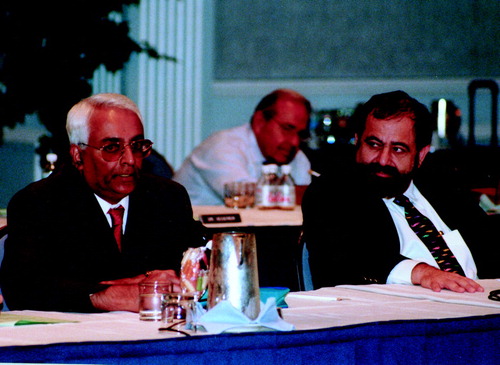Board Hears From IMG, DB Leaders
 Prior to each recent meeting of the Board of Trustees, the APA President has invited several district branch leaders or representatives of minority/underrepresented groups to talk with the Trustees about issues and concerns on their members’ minds.
Prior to each recent meeting of the Board of Trustees, the APA President has invited several district branch leaders or representatives of minority/underrepresented groups to talk with the Trustees about issues and concerns on their members’ minds.
At last month’s Board meeting in Orlando two of these leaders accepted President Richard Harding, M.D.’s invitation—Elias Sarkis, M.D., president-elect of the Florida Psychiatric Society, and Orlando psychiatrist Chowallur Chacko, M.D., a member of the Committee of International Medical Graduates.
Sarkis, who is in private practice in Gainesville, related the opinion of many members of this district branch that “APA is out of touch” with its grass-roots members and is not devoting sufficient time and resources “to the number-one concern of members, which is managed care.”
He acknowledged that members who are plugged into APA activities, such as he and other district branch leaders, realize that APA has expended substantial effort and funds in fighting managed care practices, but the Association needs to do a better job of publicizing its initiatives to members, he suggested. Too often, he added, members “expect daddy to step in and fix the problems,” unaware of how complex an organization APA is and how diverse its agenda is.
Chacko, who said he came to the United States from India 30 years ago in pursuit of “higher education in psychiatry, freedom, and a better life for [his] family,” was the first IMG psychiatrist in Orlando. He described how it felt to be an “outsider” when he attended his first district branch meeting, and how “things have changed” in his community since then, with IMGs now chairing district branch committees. In addition, he pointed out, he and his IMG colleagues are no longer relegated to treating only minority patients as they were several years ago.
IMGs “have come a long way, but still have a long way to go” in being fully integrated and accepted in the psychiatric and medical community, he said. In light of the growing number and influence of IMGs in psychiatry, Chacko called on the Trustees to ensure that more IMGs are appointed to APA components, and not just the ones that deal with IMG issues. “We are half of the psychiatrists of tomorrow, and we are enriching psychiatry,” he stated.



